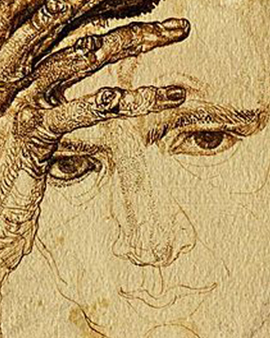In the dazzling landscape of the Russian avant-garde, one name stands out in particular: Pavel Nikolaevich Filonov. A painter, poet and art historian whose inimitable works made him a singular personality. Born in Moscow on January 8, 1883, and died in Leningrad on December 3, 1941, Filonov left a creative footprint that was not duly recognized until many years after his death, in the late 1970s to early 1980s. Much of his oeuvre is housed in the Russian Museum, which had no opportunity to exhibit his works for decades due to political conditions.
Filonov was born in 1883 in a working-class family, marked by poverty and early parental loss. Nevertheless, he showed his artistic talent at a young age. After completing his education as a painter and decorator in Moscow, he took up training at the Academy of Arts, but left without a degree. During this time he founded the "Union of Youth" and participated in various exhibitions. In addition, Filonov undertook numerous trips that enriched his artistic understanding and his conception of the world. An expressive work from 1940, titled "Faces," captures the emotions of the subjects depicted with delicate brushstrokes and vibrant colors. This painting, now available as a high quality fine art print, allows the viewer to admire the genius of Filonov's work up close.
His extraordinary abilities were especially expressed in his concept of analytical art. Filonov strove for a representation that captured the "plant-like-organic" as well as the "mystical-cosmic" while allowing the "knowing eye" to discover hidden processes. These artful depictions by Filonov can be admired today in the form of high quality art prints that reflect the extraordinary level of detail and artistic brilliance of his originals. Despite the appreciation Filonov received posthumously, his entire oeuvre was kept in Russia and could not be exhibited for decades due to political tensions. Recognition of his work in art history did not come until the late 1970s to early 1980s. Nevertheless, Filonov's influence is undisputed and his works, now available in the form of exquisite art prints, speak for themselves and add a valuable contribution to the world of art.
×





 - (MeisterDrucke-220450).jpg)
 - (MeisterDrucke-220450).jpg)
 - (MeisterDrucke-189498).jpg)
 - (MeisterDrucke-189498).jpg)
.jpg)
.jpg)
 - (MeisterDrucke-214990).jpg)
 - (MeisterDrucke-214990).jpg)
.jpg)
.jpg)
 - (MeisterDrucke-156128).jpg)
 - (MeisterDrucke-156128).jpg)
.jpg)
.jpg)
.jpg)
.jpg)
_aquare_-_(MeisterDrucke-1322748).jpg)
_aquare_-_(MeisterDrucke-1322748).jpg)
.jpg)
.jpg)
_1914_State_-_(MeisterDrucke-1322940).jpg)
_1914_State_-_(MeisterDrucke-1322940).jpg)
.jpg)
.jpg)
.jpg)
.jpg)
_huile_-_(MeisterDrucke-1325840).jpg)
_huile_-_(MeisterDrucke-1325840).jpg)
_Peinture_de_Pavel_Nikolayevich_Filonov_(1883-1941)_1930_Sta_-_(MeisterDrucke-1003198).jpg)
_Peinture_de_Pavel_Nikolayevich_Filonov_(1883-1941)_1930_Sta_-_(MeisterDrucke-1003198).jpg)
_-_(MeisterDrucke-262704).jpg)
_-_(MeisterDrucke-262704).jpg)
.jpg)
.jpg)
_-_(MeisterDrucke-911300).jpg)
_-_(MeisterDrucke-911300).jpg)
_Peinture_de_Pavel_Nikolayevich_Filonov_(1883_-_(MeisterDrucke-1317979).jpg)
_Peinture_de_Pavel_Nikolayevich_Filonov_(1883_-_(MeisterDrucke-1317979).jpg)
.jpg)
.jpg)
.jpg)
.jpg)
.jpg)
.jpg)
_1931_(oil_on_canvas)_-_(MeisterDrucke-1115690).jpg)
_1931_(oil_on_canvas)_-_(MeisterDrucke-1115690).jpg)
_Peinture_de_Pavel_Nikolayevich_Filonov_(18_-_(MeisterDrucke-1014983).jpg)
_Peinture_de_Pavel_Nikolayevich_Filonov_(18_-_(MeisterDrucke-1014983).jpg)
_Oeuvre_de_Pavel_Nikolayevich_Filonov_(18_-_(MeisterDrucke-1318184).jpg)
_Oeuvre_de_Pavel_Nikolayevich_Filonov_(18_-_(MeisterDrucke-1318184).jpg)
.jpg)
.jpg)
.jpg)
.jpg)
_aquarelle_sur_papie_-_(MeisterDrucke-1322747).jpg)
_aquarelle_sur_papie_-_(MeisterDrucke-1322747).jpg)
.jpg)
.jpg)
_-_(MeisterDrucke-1325858).jpg)
_-_(MeisterDrucke-1325858).jpg)
_huile_sur_toile_-_(MeisterDrucke-1318823).jpg)
_huile_sur_toile_-_(MeisterDrucke-1318823).jpg)
_1925_State_Russian_-_(MeisterDrucke-1323592).jpg)
_1925_State_Russian_-_(MeisterDrucke-1323592).jpg)
.jpg)
.jpg)
 - (MeisterDrucke-188885).jpg)
 - (MeisterDrucke-188885).jpg)
.jpg)
.jpg)
_Peinture_de_Pavel_Nikolayevic_-_(MeisterDrucke-1313900).jpg)
_Peinture_de_Pavel_Nikolayevic_-_(MeisterDrucke-1313900).jpg)
_Peinture_de_Pavel_N_-_(MeisterDrucke-1322989).jpg)
_Peinture_de_Pavel_N_-_(MeisterDrucke-1322989).jpg)
_huile_sur_toile_a_-_(MeisterDrucke-1323593).jpg)
_huile_sur_toile_a_-_(MeisterDrucke-1323593).jpg)
.jpg)
.jpg)
_Portrait_dun_fermier_dURSS_durant_la_peri_-_(MeisterDrucke-1318185).jpg)
_Portrait_dun_fermier_dURSS_durant_la_peri_-_(MeisterDrucke-1318185).jpg)
_-_(MeisterDrucke-1318536).jpg)
_-_(MeisterDrucke-1318536).jpg)
.jpg)
.jpg)
_1914-1915_State_-_(MeisterDrucke-1317980).jpg)
_1914-1915_State_-_(MeisterDrucke-1317980).jpg)
_Monstres_geants_envahissant_les_rues_dune_ville_Oeuvre_de_Pave_-_(MeisterDrucke-1320694).jpg)
_Monstres_geants_envahissant_les_rues_dune_ville_Oeuvre_de_Pave_-_(MeisterDrucke-1320694).jpg)






